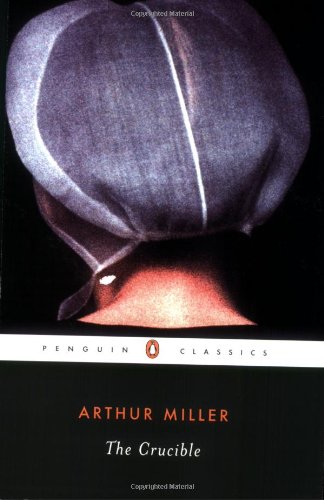All Nonfiction
- Bullying
- Books
- Academic
- Author Interviews
- Celebrity interviews
- College Articles
- College Essays
- Educator of the Year
- Heroes
- Interviews
- Memoir
- Personal Experience
- Sports
- Travel & Culture
All Opinions
- Bullying
- Current Events / Politics
- Discrimination
- Drugs / Alcohol / Smoking
- Entertainment / Celebrities
- Environment
- Love / Relationships
- Movies / Music / TV
- Pop Culture / Trends
- School / College
- Social Issues / Civics
- Spirituality / Religion
- Sports / Hobbies
All Hot Topics
- Bullying
- Community Service
- Environment
- Health
- Letters to the Editor
- Pride & Prejudice
- What Matters
- Back
Summer Guide
- Program Links
- Program Reviews
- Back
College Guide
- College Links
- College Reviews
- College Essays
- College Articles
- Back
The Crucible by Arthur Miller
Written in 1953 by the American essayist and playwright Arthur Miller, "The Crucible" is a powerful dramatization of the 1692 and 1693 Salem witch trials in the Province of Massachusetts Bay. The play follows the story of a plain farmer, John Proctor, a simple, imperfect man who is faced with the task of questioning his own morality and that of the society he belongs to. When Proctor’s wife is falsely accused of witchcraft by a vengeful teenager motivated by hopes of self-gain, the village becomes consumed in ever-multiplying accusations. Neighbors accuse each other of consorting with the Devil in the hopes of obtaining more land should the accused end up in prison, children pretend to become bewitched in order to divert blame from themselves unto others, and good, charitable people are sentenced to be hanged despite the absurdity of the court proceedings.
After all, these trials are anything but normal. As stated in the play by Deputy Governor Danforth, an ordinary crime would involve “one [calling] up witnesses to prove [the accused person’s] innocence. But witchcraft is… on its face and by its nature, an invisible crime… Therefore, who may possibly be witness to it? The witch and the victim … Now we cannot hope the witch will accuse herself… Therefore, we must rely upon her victims.” The question that then arises is, what should a court do if the so-called-victims are not truthful in their accusations?
Arthur Miller attempts to address this question while also bringing forth the themes of mass hysteria, spirituality, guilt, responsibility, and the seductions of power. An allegory for the early 1950’s McCarthy investigations for suspected Communists, "The Crucible" presents characters with strikingly strong qualities. Elizabeth Proctor is an honest woman who would never lie except to protect her husband. Abigail Williams is a convincing liar who can change in a moment from a seemingly sweet and loving girl to a violent and tyrannical murderer. John Proctor, who has been claimed by some critics to be a too-perfect character, is a well-respected and independent-minded farmer plagued by guilt and uncertainty over how he might redeem himself and save the ones he loves.
All in all, "The Crucible" by Arthur Miller is an intense contemplation on morality and society. One of Miller’s most produced plays, "The Crucible" is a text that will leave a lasting impact on its viewers and readers.
Similar Articles
JOIN THE DISCUSSION
This article has 0 comments.

